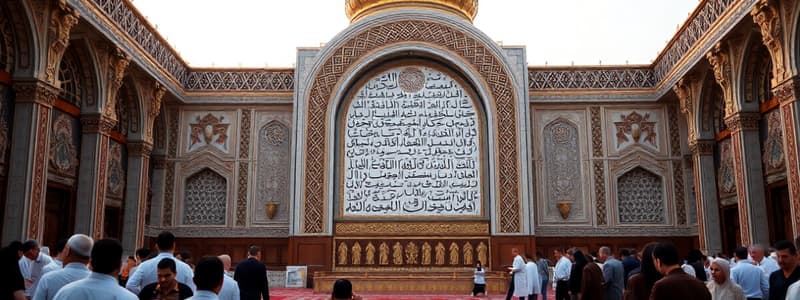Podcast
Questions and Answers
What is the primary reason for prohibiting lending at interest?
What is the primary reason for prohibiting lending at interest?
Which of the following transactions would likely be categorized as Riba al-fadl?
Which of the following transactions would likely be categorized as Riba al-fadl?
What does the prohibition of derivative instruments relate to?
What does the prohibition of derivative instruments relate to?
Which items are mentioned as needing to be exchanged equally when traded among themselves?
Which items are mentioned as needing to be exchanged equally when traded among themselves?
Signup and view all the answers
What consequence is mentioned for those who continue to engage in Riba?
What consequence is mentioned for those who continue to engage in Riba?
Signup and view all the answers
What does the economic rationale for eliminating Riba emphasize?
What does the economic rationale for eliminating Riba emphasize?
Signup and view all the answers
What should a lender do if the debtor experiences difficulty in repayment?
What should a lender do if the debtor experiences difficulty in repayment?
Signup and view all the answers
What message is conveyed by the comparison of trade and usury?
What message is conveyed by the comparison of trade and usury?
Signup and view all the answers
What is one primary difference between current accounts and investment accounts in an Islamic bank?
What is one primary difference between current accounts and investment accounts in an Islamic bank?
Signup and view all the answers
What type of risk is a significant concern for Islamic banks when managing investment accounts?
What type of risk is a significant concern for Islamic banks when managing investment accounts?
Signup and view all the answers
How do investment accounts in Islamic banks differ in terms of depositor rights compared to traditional depositors?
How do investment accounts in Islamic banks differ in terms of depositor rights compared to traditional depositors?
Signup and view all the answers
What is a strategy used by Islamic banks to manage volatility in remuneration for investment accounts?
What is a strategy used by Islamic banks to manage volatility in remuneration for investment accounts?
Signup and view all the answers
What challenge do Islamic banks face with regard to corporate governance?
What challenge do Islamic banks face with regard to corporate governance?
Signup and view all the answers
What is the purpose of allowing traditional banks to open Islamic windows?
What is the purpose of allowing traditional banks to open Islamic windows?
Signup and view all the answers
What is a feature of deposit accounts that do not pay interest in Islamic banks?
What is a feature of deposit accounts that do not pay interest in Islamic banks?
Signup and view all the answers
How does the depositor in an Islamic bank's investment account typically compare to shareholders?
How does the depositor in an Islamic bank's investment account typically compare to shareholders?
Signup and view all the answers
What does Riba refer to in Islamic finance?
What does Riba refer to in Islamic finance?
Signup and view all the answers
In a Murabaha transaction, what role does the Islamic bank play when payment is immediate?
In a Murabaha transaction, what role does the Islamic bank play when payment is immediate?
Signup and view all the answers
What is a key characteristic of Mudaraba contracts?
What is a key characteristic of Mudaraba contracts?
Signup and view all the answers
Which of the following statements about Islamic banks and deposits is true?
Which of the following statements about Islamic banks and deposits is true?
Signup and view all the answers
In a Mudaraba agreement, who contributes capital?
In a Mudaraba agreement, who contributes capital?
Signup and view all the answers
What distinguishes Musharaka from Mudaraba?
What distinguishes Musharaka from Mudaraba?
Signup and view all the answers
Which of the following is NOT an aspect of participation contracts in Islamic finance?
Which of the following is NOT an aspect of participation contracts in Islamic finance?
Signup and view all the answers
What happens to the nominal value of deposits in a Mudaraba agreement during losses?
What happens to the nominal value of deposits in a Mudaraba agreement during losses?
Signup and view all the answers
What role does the customer play in a Mudaraba contract?
What role does the customer play in a Mudaraba contract?
Signup and view all the answers
What happens if the Mudaraba project generates profits?
What happens if the Mudaraba project generates profits?
Signup and view all the answers
If the project incurs losses, who primarily bears the losses?
If the project incurs losses, who primarily bears the losses?
Signup and view all the answers
In a Mudaraba agreement, what must the bank verify before agreeing to fund a project?
In a Mudaraba agreement, what must the bank verify before agreeing to fund a project?
Signup and view all the answers
What commission does the company receive from the project's profits in the second Mudaraba contract?
What commission does the company receive from the project's profits in the second Mudaraba contract?
Signup and view all the answers
What will occur if the project is sold for 850,000 dirhams and incurs a loss?
What will occur if the project is sold for 850,000 dirhams and incurs a loss?
Signup and view all the answers
What is required for a Mudaraba contract to be considered valid?
What is required for a Mudaraba contract to be considered valid?
Signup and view all the answers
What is the main purpose of a Murabaha contract in Islamic banking?
What is the main purpose of a Murabaha contract in Islamic banking?
Signup and view all the answers
In a Murabaha contract, what does the bank acquire before selling it to the customer?
In a Murabaha contract, what does the bank acquire before selling it to the customer?
Signup and view all the answers
How is the profit margin determined in a Murabaha contract?
How is the profit margin determined in a Murabaha contract?
Signup and view all the answers
What happens to ownership of the asset in a Murabaha contract once the customer makes the full payment?
What happens to ownership of the asset in a Murabaha contract once the customer makes the full payment?
Signup and view all the answers
What risk is the bank exposed to in a Murabaha contract?
What risk is the bank exposed to in a Murabaha contract?
Signup and view all the answers
Which banks in the UK have opened Islamic branches?
Which banks in the UK have opened Islamic branches?
Signup and view all the answers
What is a significant challenge posed by Islamic banking in relation to tax treatment?
What is a significant challenge posed by Islamic banking in relation to tax treatment?
Signup and view all the answers
What is the total amount the customer agrees to pay in the car purchase example using Murabaha?
What is the total amount the customer agrees to pay in the car purchase example using Murabaha?
Signup and view all the answers
In a musharaka partnership, how is profit sharing typically determined?
In a musharaka partnership, how is profit sharing typically determined?
Signup and view all the answers
What is the loss borne by the bank if a loss of 100,000 ryals occurs in the second year?
What is the loss borne by the bank if a loss of 100,000 ryals occurs in the second year?
Signup and view all the answers
What percentage of profits is allocated to the Qatari company in the musharaka example?
What percentage of profits is allocated to the Qatari company in the musharaka example?
Signup and view all the answers
What is the first step in the ijara process?
What is the first step in the ijara process?
Signup and view all the answers
In the musharaka scenario, what is the total capital contributed by both partners?
In the musharaka scenario, what is the total capital contributed by both partners?
Signup and view all the answers
What defines the ijara wa iqtinà agreement?
What defines the ijara wa iqtinà agreement?
Signup and view all the answers
What was the profit earned by the bank in the first year of operations?
What was the profit earned by the bank in the first year of operations?
Signup and view all the answers
Why might a person enter into an ijara agreement?
Why might a person enter into an ijara agreement?
Signup and view all the answers
Study Notes
Islamic Banking System
- Islamic banking operates under Sharia guidelines, which are ethical and moral principles.
- Islamic banks avoid interest (riba) and instead focus on profit-sharing and other ethical practices.
- The core of Islamic finance centers around avoiding practices considered detrimental to society.
Ancient Laws
- Lending money with interest was considered usury in ancient times.
- Ancient laws often forbade the payment of interest, as debtors frequently ended up enslaved.
- Laws like Hammurabi's code (1754 BC) detailed regulations on property, family, trade, and business practices.
- Solon (ancient Greece) abolished debt slavery and implemented a system based on citizens' financial capacity.
- Interest limitations existed in ancient Rome.
Philosophical Point of View
- Plato (V/IV century BC) considered the accumulation of money detrimental, often leading to conflict.
- Aristotle (V/IV century BC) criticized the production of money from money, arguing it was unjust.
- Aristotle viewed the mere accumulation of wealth as not the aim of a good life, rather it is a tool for something else.
Religions
- Jewish religion excluded interest-based loans for compatriots.
- Leviticus (35, 35-37) discouraged charging interest on loans to fellow Israelites.
- Deuteronomy (23, 20-21) permitted interest for loans to foreigners but not fellow citizens.
- Psalms 15 and Nehemiah 5, 7-8 highlight the proscription of interest.
- Christian religion traditionally prohibited interest-based loans.
- Saint Luke (6:35-37) emphasizes lending without expectation of return for divine reward and growth.
Evolution of Christian Thought on Usurers
- The desire to deem even the worst sinners "good Christians" motivated the Church.
- 13th-century Christian theologians viewed usury as a form of theft against justice.
- The 13th century saw the consideration of usury as unjust, that a sum should not be charged for the use of money.
- A reasonable interest rate was defined as a means of upholding the right and just valuation of an asset.
Usury Rates in Italy (Laws)
- Law 108/96 considers disproportionate interest as usury.
- Law 108/96 refers to the Average Global Effective Rate to define a limit on profit for loans.
- Legislative Decree 70/2011 modifies Law 108/96 by establishing a threshold rate based on the quarterly Bank of Italy reports.
- The difference between the threshold and average rate cannot exceed 8 percentage points.
The Koran
- The Koran is the holy book of Islam and provides the foundation for Islamic belief and worship.
- The Koran is divided into Suras (chapters) arranged in order of decreasing length.
Homo Islamicus
- Islam imparts prescriptions about economic aspects, including resource value, work, property, wealth distribution, trade, finance, competition, and the state's role in taxation.
- Natural resources belong to Allah and must be used for development, adhering to nature protection laws.
- Income distribution should be fair, and profit generation shouldn't lead to the inequality or exploitation of individuals or communities.
Homo Islamicus: Financial Issues
- Islamic banking is structured on Sharia laws that emphasize ethical principles.
- Sharia forbids interest and specific financial or business practices.
- Sharia aims to promote justice, efficiency, and stability in financial transactions.
Brief History of Islamic Banking System
- Islamic banking emerged in 1963 in Egypt with local savings banks and evolved throughout the 1970s and 1980s in various countries.
- Islamic banking, while growing, continues to represent a small percentage of the global banking system.
Islamic School of Law
- Various schools of Islamic law offer interpretations of the same rules.
- These differing interpretations prevent a singular understanding of the legality of financial instruments.
Riba
- Riba refers to the prohibition of predetermined, guaranteed returns on loans or transactions.
- Several types of Riba exist, including Riba al-nasi'ah (deliberate postponement or deferment of payment), and Riba al-fadl (exchange of commodities of unequal value).
- Islamic principles govern money transactions, with certain activities permissible and others (e.g. pre-determined fixed rate interest) forbidden.
Types of Riba
- Riba al-nasi'ah concerns the time allowed for loan repayment.
- Riba al-fadl relates to the exchange of goods with varying value.
- Illegitimate transactions, such as gambling, excessive uncertainty, inappropriate derivatives, and transactions related to forbidden goods (alcohol, pornography) can be considered as types of Riba as well.
Participation Contracts
- Participation agreements allow stakeholders to share in project gains or losses.
- Mudaraba exemplifies participation in profits, while Musharaka involves participation in both profits and losses, reflecting a partner-based financial model where banks and clients directly contribute to asset creations.
Mudaraba
- Mudaraba involves clients contributing expertise and banks supplying capital for project-driven financial transactions.
- Mudaraba can take the form of a binding or non-binding contract, providing greater flexibility.
- The bank and the client share profit, or lose depending on project earnings.
Musharaka
- Musharaka is an agreement where both banks and clients actively contribute to a project, then splitting any gained or lost returns correspondingly.
Ijara(Transfer of Usufruct)
- Ijara encompasses the leasing of assets and transferring ownership back to the seller after the contract's conclusion, providing a mechanism for financial leasing of assets.
- The lessee pays a periodic fee to the lessor, similar to a rental agreement, and the process transfers ownership back to the seller after the contract's termination—a transfer of usufructuary rights.
Deposit Accounts
- Islamic banks manage deposits in a way that avoids specific transactions defined as interest (Riba).
- The goal is to share in business profits or losses, rather than simply charging interest for providing money.
- Several Islamic banks operate within Western legal architectures by utilizing specific structures (e.g., "Islamic window") to conduct financial dealings within regulatory frameworks.
Studying That Suits You
Use AI to generate personalized quizzes and flashcards to suit your learning preferences.
Related Documents
Description
This quiz explores the fundamental concepts of Riba in Islamic finance, including its prohibition, related transactions, and economic implications. Test your knowledge on the differences between lending at interest and trade. Gain insights into the ethical considerations surrounding financial dealings in Islam.





